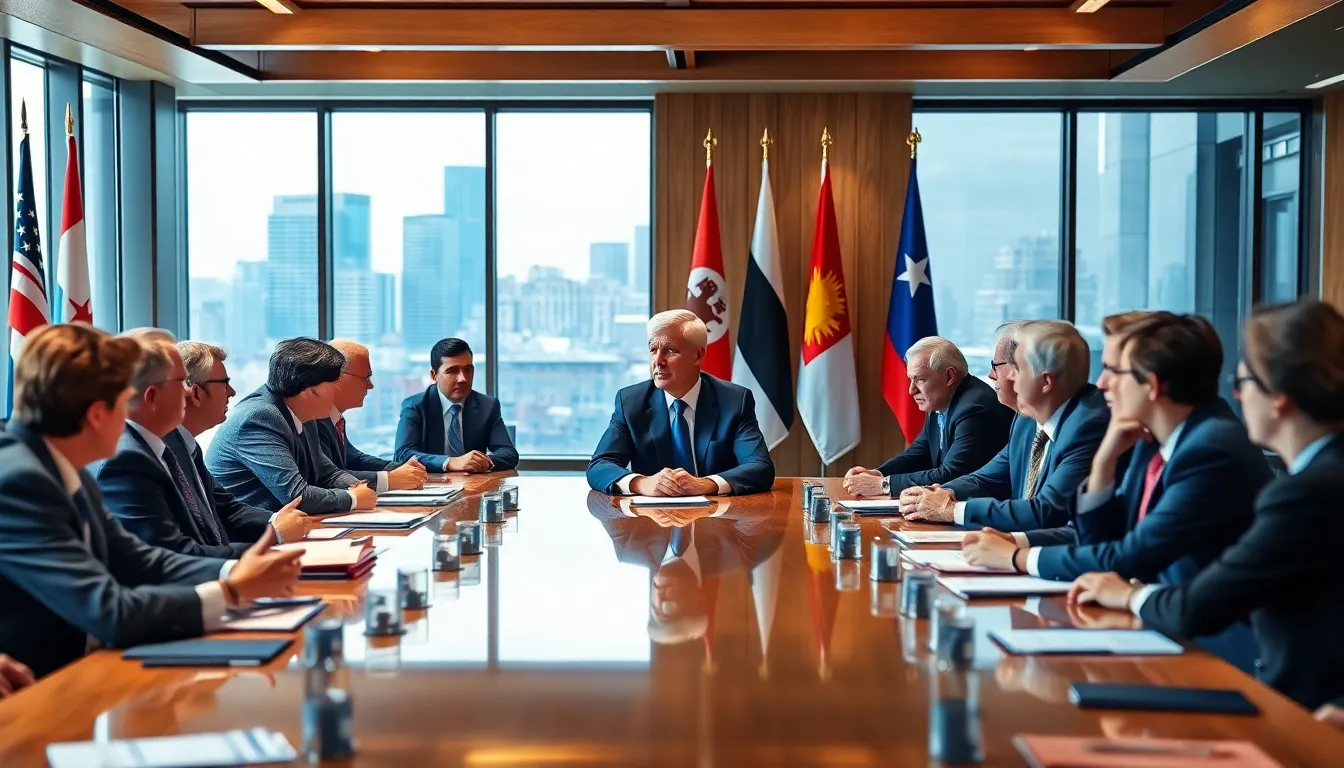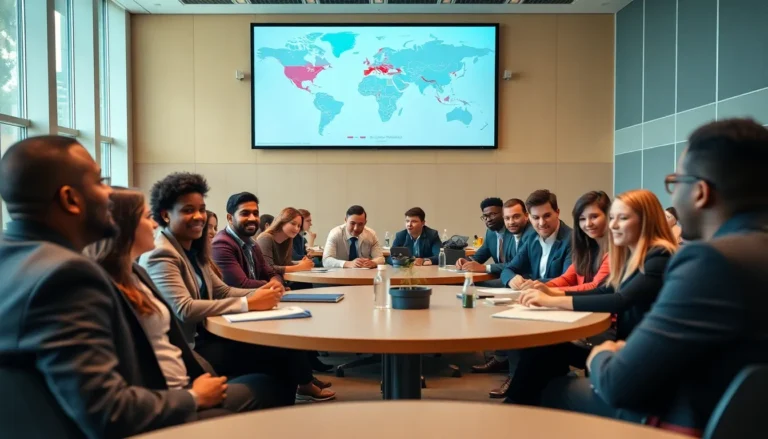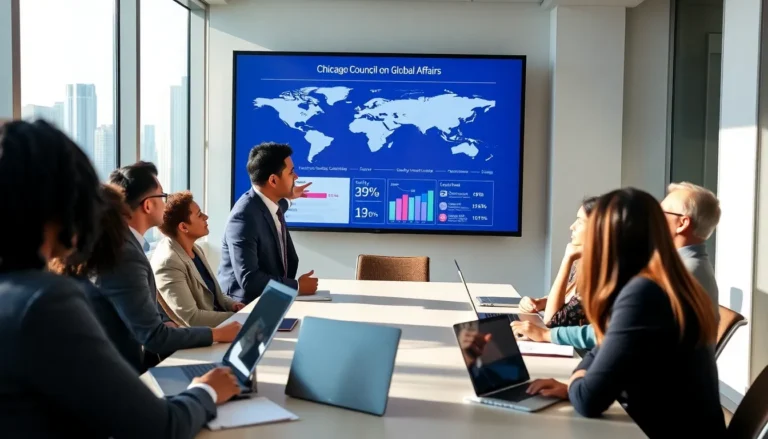Table of Contents
ToggleIn an increasingly interconnected world, understanding the dynamics of global politics is more crucial than ever. From shifting alliances to emerging powers, the landscape of international relations is constantly evolving. These changes shape not only national policies but also impact economies and societies across the globe.
World politics insights delve into the intricate web of diplomacy, conflict, and cooperation that defines how nations interact. By exploring key events and trends, one can gain a clearer perspective on the forces driving global issues today. Whether it’s climate change, trade negotiations, or geopolitical tensions, these insights provide valuable context for anyone looking to navigate the complexities of our world.
Overview of World Politics Insights
World politics involves a dynamic landscape shaped by interconnections among nations. Understanding key themes and historical context provides valuable insights into current global issues.
Key Themes and Concepts
- Globalization: Globalization plays a significant role by facilitating economic integration and cross-cultural exchanges. It impacts trade, communication, and the movement of people across borders.
- Multilateralism: Multilateralism emphasizes cooperation among multiple countries. Organizations like the United Nations exemplify this approach, promoting dialogue and collective action on global challenges.
- Sovereignty: Sovereignty defines a nation’s authority over its territory and governance. It influences international relations by dictating how states interact and respect each other’s boundaries.
- Geopolitics: Geopolitics examines how geographical factors affect political behavior and power dynamics. Resources, location, and environmental issues shape countries’ strategies and alliances.
- Human Rights: Human rights remain a crucial theme, guiding international relations and foreign policies. Issues surrounding social justice, equality, and humanitarian aid continue to evolve.
Historical Context
- World Wars: The World Wars dramatically transformed global politics, reshaping alliances and introducing organizations aimed at preventing future conflicts. These events established frameworks for international cooperation.
- Cold War: The Cold War era highlighted ideological divides and power struggles between the U.S. and the Soviet Union. It influenced military strategies, alliances, and global diplomacy.
- Decolonization: The mid-20th century saw many nations achieve independence, redrawing political boundaries. Decolonization shifted power dynamics and introduced new voices in global politics.
- Post-Cold War Era: The collapse of the Soviet Union marked a transition toward unipolarity, with the U.S. as the dominant global power. Emerging economies began to gain influence, leading to a multipolar world.
- 21st Century Challenges: Contemporary issues such as terrorism, climate change, and cyber threats significantly impact international relations. Nations must adapt to these challenges, influencing collaboration and policy-making.
Major Global Issues

Global politics faces several pressing challenges, impacting international stability and cooperation. Understanding these issues is crucial for navigating today’s complex geopolitical landscape.
Conflict and Security
Conflicts remain a significant concern in world politics. Global tensions arise from territorial disputes, ethnic conflicts, and ideological differences. For instance, ongoing disputes in regions like the South China Sea and Eastern Europe highlight the fragility of security arrangements. Terrorism poses another severe threat, prompting nations to cooperate on intelligence sharing and counterterrorism efforts. Cybersecurity concerns also escalate as states engage in cyber warfare and espionage. In response, international organizations work to foster dialogue and develop conflict resolution mechanisms, essential for maintaining global peace.
Economic Trends
Economic trends shape the global political environment significantly. Trade tensions, particularly between major economies like the United States and China, influence international relations. Protectionist policies impact global supply chains, altering trade dynamics and economic growth. Additionally, the rise of digital currencies and e-commerce reshapes financial systems, prompting nations to adapt regulatory frameworks. Economic inequality persists, leading to social unrest in various countries. Addressing these economic issues requires international collaboration and proactive policy-making to ensure sustainable development and equitable growth.
Regional Focus
Understanding regional politics is crucial for grasping global dynamics. Each region faces unique challenges and influences international relations.
North America
North America features significant political dynamics, primarily driven by the United States, Canada, and Mexico. The U.S. maintains strong relationships with its neighbors, focusing on trade agreements like the United States-Mexico-Canada Agreement (USMCA). Immigration policies and security cooperation, especially concerning border management, reflect ongoing governance concerns. Additionally, regional challenges such as climate change and economic inequality shape domestic and foreign policies.
Europe
Europe experiences complex political interactions influenced by the European Union (EU). Member states strive for cohesion on issues like migration, trade, and defense. The rise of populism and nationalism in several countries disrupts traditional alliances, challenging EU unity and policy implementation. Moreover, geopolitical tensions with Russia and trade negotiations, particularly surrounding Brexit, require careful diplomacy to maintain regional stability.
Asia
Asia presents a multifaceted political landscape with emerging powers like China and India. China’s Belt and Road Initiative promotes economic ties across the region, aiming to enhance infrastructure and trade. Territorial disputes in the South China Sea heighten tensions with neighboring countries, while North Korea’s nuclear ambitions pose security threats. India’s growing influence and strategic partnerships with nations such as Japan and Australia reflect shifts in regional power dynamics, requiring nuanced diplomatic engagement.
Influential Political Theories
Political theories provide foundational frameworks for understanding global politics. Two significant theories are realism and liberalism, along with constructivism, each offering unique insights into international relations.
Realism and Liberalism
Realism emphasizes the role of power and national interests in global politics. It asserts that states act primarily in pursuit of their interests, often leading to a struggle for power. This perspective is grounded in the belief that human nature is inherently conflictual, affecting state behavior and interactions. Realist theorists like Hans Morgenthau argue that the anarchic nature of the international system compels states to prioritize survival.
Liberalism counters realism by highlighting the potential for cooperation and interdependence among states. It focuses on international institutions and norms that foster collaboration, emphasizing the importance of democracy, human rights, and economic ties. Scholars like Robert Keohane point out that institutions, such as the United Nations, play a vital role in mitigating conflict and promoting peace through dialogue and diplomacy.
Constructivism
Constructivism introduces the idea that international relations are shaped by social constructs and collective identities. It emphasizes the importance of ideas, beliefs, and norms in influencing state behavior and interactions. Unlike realism and liberalism, which focus on material factors, constructivism posits that the identities and interests of states are not given but are constructed through social interactions. Scholars like Alexander Wendt argue that understanding the social context is crucial for grasping the complexities of global politics. Constructivism highlights how shared understandings and social practices can lead to cooperation or conflict among nations.
Impact of Technology on Politics
Technology significantly influences politics, reshaping how political actors engage with their constituents and each other. The rise of digital platforms, particularly social media, has transformed political communication and mobilization.
Social Media Influence
Social media platforms act as powerful tools for political discourse, enabling rapid dissemination of information. Politicians use platforms like Twitter, Facebook, and Instagram to communicate directly with voters, bypassing traditional media. Increased engagement occurs through campaigns that target specific demographics based on their online behavior. For instance, in the 2020 U.S. presidential election, over 77% of voters utilized social media for political information, affecting their electoral choices. Misleading information and political advertisements on these platforms can also sway public opinion and polarize communities, highlighting the significant role of social media in shaping political landscapes.
Cybersecurity Concerns
Cybersecurity presents substantial challenges to political systems worldwide. Increasing reliance on digital infrastructure exposes governments and political institutions to hacking and cyberattacks. According to the Center for Strategic and International Studies, over 200 significant cyber incidents against governments were reported in 2021 alone. These threats compromise sensitive information and can disrupt electoral processes, as seen in the 2016 U.S. presidential election, where cybersecurity breaches compromised political organizations. Ensuring robust cybersecurity measures is imperative to protect democratic institutions and maintain public trust in political processes.
Understanding world politics is essential for navigating today’s complex global landscape. As nations confront shared challenges and opportunities, the need for informed dialogue and collaboration becomes increasingly clear. The interplay of historical contexts, regional dynamics, and political theories shapes the actions of states and their leaders.
With the rise of new powers and the ongoing evolution of international relations, staying informed about global trends is crucial. The ability to adapt to shifting alliances and emerging issues will determine not only national policies but also the future of international stability. Engaging with these insights empowers individuals and communities to contribute meaningfully to discussions that shape our world.





